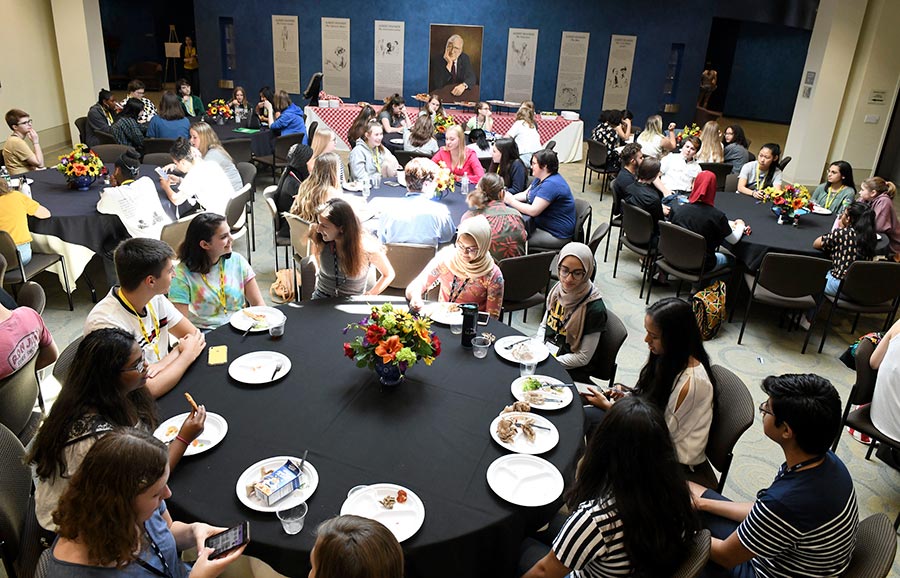Student activism is soaring across the country, and that momentum showed up this week at NYSUT — 93 students strong. They are here for the fifth annual Capital Region Institute for Human Rights Teen Summer Symposium.
Attendance spiked from 70 students last year. The high school students are here for three days of learning about issues such as how to create and build on a movement; historical education about women’s rights and LGBTQ concerns; taking on climate change; how to hold power and how it can be lost; and how to make change from a corner of a classroom to across the globe in Uganda.
Saskia Dolan, a North Colonie Teachers Association member, gave students an overview of the history of women’s reproductive rights, a focus of national news right now. She showed how this is a social justice issue that has been used as a political tool to suppress women, and even for anti-immigration. Dolan explained how the American Medical Association — whose practitioners profited by women having children — once flagrantly asked in a statement: “Shall these regions be filled by our own children or by those of aliens?”
The 5th and 14th amendments, she pointed out, guarantee liberty and privacy — which includes bodily integrity.
But opponents don’t see it that way. “It’s about more than reproductive rights. It’s about economics. It’s about politics,” Dolan said.
Photo Gallery

NYSUT Executive Vice President Jolene DiBrango, who oversees NYSUT’s research department and the women’s committee for the statewide organization, told the students NYSUT and its teachers support student movements for change.
“Many teachers are activists,” she said. “We use our collective voices.” She told students that the lessons they are being taught in high school will inform them in their quests to make a difference in taking on climate change or inequality.
“We’re behind this work,” DiBrango said. “I hope you never lose this activism … I’m wishing you a space and place for you to use your voice.”
Activist James Shultis educated students about how to choose one problem facing a community and then examine its underlying historical, social and economic roots.
How to tackle a problem in your community
- Determine what structures, policies and practices institutionalize the problem?
- Gather supporters, build power, and find out how to “make noise.”
- Form a student group; reach out to lawmakers about the issue; send out petitions and host events.
- Use text message campaigns, school assemblies, visits to the local school board, and visual representation of a cause through art.
Hudson Falls TA member Alison Lattimore, a school librarian and volunteer with the Institute, said her focus on activism for LGBTQ rights began in the ‘80s. Lattimore’s college roommate was marginalized for being gay. People also gave Lattimore strong and strange reactions to having a gay roommate.
Ishita Khambete, a student at Shaker High School, said the summer symposium is a good way to learn and to connect with peers from the region. She hopes to pass on what she is learning about human rights to her peers in Key Club, which focuses on community service.
William Corley, a recent graduate of Amsterdam High School, is attending for his second year. His first foray into activism came when he formed a group in response to the Parkland, Fla. school shooting. Corley’s group made orange bows to show support. He also had 310 petitions urging gun reform signed and sent to Congress.

After immersing himself in the symposium last year, Corley received approval to put together a two-part seminar on women’s rights at school. He said he received more than 100 positive comments in student feedback.
The Capital Region Institute for Human Rights is led by co-director and founder Thea MacFawn, a teacher and member of the North Colonie TA; and co-director Kelley Wetherbee, a librarian member of the North Colonie TA.